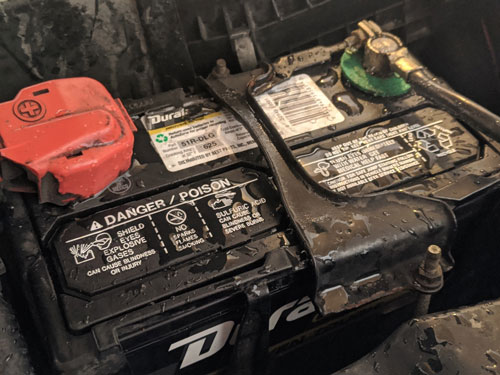Last Updated on April 24, 2023 by Ryan
Yes, it is possible to change a car battery in the rain. However, you should take extra precautions when doing so since water and electricity do not mix well. Before beginning, make sure that all of your tools are insulated from the elements and wear protective clothing such as rubber boots and gloves.
Additionally, avoid making contact with metal components or parts of the vehicle while working on the battery to minimize chances of electrocution. Once finished disconnecting and reconnecting any cables leading to the old battery be sure to spray down any open connectors or wiring with a waterproof sealant before reinstalling them onto your new battery.
- Gather the right tools – Before attempting to change a car battery in the rain, make sure you have all of the necessary tools for the job such as pliers, wrenches, socket sets and screwdrivers
- Additionally, it is important to wear protective clothing like rubber gloves and boots when working with a wet battery in order to avoid getting shocked or burned by any acid that may be present
- Locate and remove old battery – Once all required tools are gathered together then locate your vehicle’s old battery and unbolt it from its mounting bracket using a wrench or ratchet set (depending on what type of mounting system your vehicle has)
- Remove any cables connected to the terminals before lifting out the old unit
- Clean connections – Use some baking soda mixed with water on an abrasive pad or rag to clean any corrosion off of the cable ends connecting them firmly onto their respective terminals once free from their current location
- This will help ensure that there is good contact between them later on when installing your new one so no power goes missing during operation time
- 4
- Install new Battery – Carefully place down your new car battery into its designated spot being careful not to drop it as this could cause damage, then reconnect each terminal’s corresponding cable end making sure they are secured tightly with either nuts & bolts or clamps depending again on which type of mounting system yours has been fitted with previously 5
- Test New Battery – After installation is complete turn over engine ignition switch just enough until dashboard lights up but don’t actually start car yet as this can cause damage if done while still wet outside conditions exist; instead check voltage levels at both positive (+) & negative (-) posts by placing multimeter leads across them if available otherwise simply use voltmeter tool if only one exists ensuring readings come back correct before turning keys further & starting engine safely
Never Change Your Car’s Battery Like This
What Happens If a Car Battery Gets Wet?
If a car battery gets wet, it can cause serious damage. The water could corrode the terminals and posts of the battery, preventing them from making proper contact with each other. This can lead to poor charge acceptance or difficulty starting the vehicle.
In extreme cases, water entering the cells of a flooded lead-acid car battery can cause short circuits and even explosions due to hydrogen gas buildup within the cells. If your car battery gets wet, you should take it out and have it checked by an automotive professional. They may be able to dry out the battery if only external components were affected by moisture but they may also recommend replacing it altogether if there has been any internal damage caused by contact with water.
Is It Ok to Jump Start a Car in the Rain?
It is not recommended to jump start a car in the rain due to the risk of electric shock. When attempting to jump start a vehicle, both cars should be parked close together with their hoods open and all electrical components turned off. The wet environment caused by rain can create an increased risk of electric shock if any part of the jumper cables comes into contact with water.
Additionally, moisture on the battery terminals or clamps may prevent proper connection between the two vehicles and could result in sparks that could ignite nearby flammable materials. For these reasons, it’s best to wait for dry conditions before attempting to jump start your car.
Can You Charge a Dead Car Battery in the Rain?
As with any electrical work, it is not recommended to charge a dead car battery in the rain. Water and electricity do not mix well and can be dangerous. If you must charge your battery in the rain, make sure you are wearing rubber gloves and boots for insulation against electric shock as well as waterproof clothing to protect yourself from the elements.
Additionally, take extra precautions to make sure that no water gets near or into the charging equipment or car battery itself while charging.

Credit: drivecave.com
Can You Change a Car Battery Yourself
Yes, it is possible to change a car battery yourself and it’s not as hard as you may think. With some basic tools and knowledge about your vehicle type, you can safely replace the old battery with a new one in an hour or less. However, if you’re uncomfortable doing this on your own, there are plenty of professional mechanics who will be more than happy to help out.
Can You Work on a Car Battery in the Rain
Working on a car battery in the rain is not recommended, as it can be dangerous. The water and moisture present during rainstorms may cause an electric current to run through your body if you come into contact with any exposed cables or terminals. In addition, wetness on surfaces such as the hood of your car could lead to slips and falls.
Therefore, it’s best to wait until after the storm has passed before attempting any work on a car battery.
Can You Jump a Car Battery in the Rain
It is not recommended to jump start a car battery in the rain as it can increase the risk of electric shock. If you need to attempt this, ensure that both vehicles are off and avoid any contact with metal parts while connecting the jumper cables together. It’s also important to keep your hands dry and wear rubber gloves if possible.
Conclusion
Although it is not recommended to change a car battery in the rain, if you find yourself stuck and must do so, there are measures you can take to make sure that you stay safe. Be sure to wear protective gear such as rubber gloves and boots, cover any exposed electronics with plastic bags or tarps, disconnect your negative terminal first, and avoid direct contact with metal parts for safety. With these precautions in mind, it is possible to replace a car battery even when it’s raining.



